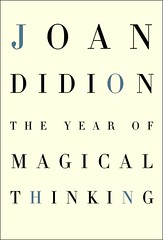Doo Wah Didion
 I remember writing a short story, never finished, which began:
I remember writing a short story, never finished, which began:Her immediate thought upon hearing that her husband was dead: "I think I have a book about that."
I've been reading that book this week.
Joan Didion's The Year of Magical Thinking is a memoir of bereavement: Didion lost both her husband, the writer John Gregory Dunne, and her daughter, Quintana, within the same awful year. Her daughter’s death occurred after the book was finished, but her hospitalization and severe illness is covered here with all the anguish and worry any parent would feel, especially in light of the sudden unexpected death of the other parent.
This is not exactly monthly book club stuff, though I suppose there will be group sales to bereavement support groups the world over. For Didion is writing here not a mere catalog of her own grief, but the universality of her experience as documented by observers from the medical community to Emily Post. (Emily seems the most aware and astute of the observers; her advice on how to deal with bereavement the most practical and correct.)
It is clear that Didion is devastated by the loss of her husband, and far be it from me to argue with her grief or her extremely lucid and frank account of it. But Joan Didion is more than a grieving widow, she is Joan Didion, a New York erudite somebody, and how that somebody-ness permeates this book is truly distracting.
Her literary agent (who is her husband’s agent too) comes over the night of the death to help. This agent’s help is to call the New York Times obituary writer personally to let him know what has happened. Joan then has the presence of mind to realize that, of course, the LA Times should be called, too: God forbid they should find out Dunne has died from reading it in the NYT.
Memories fill this book: house hunting in Honolulu and deciding that owning would not be the same as hoteling...posing on the back deck of the house in Malibu with John and Quintana for People Magazine...thinking back on poems they both liked, including one composed by Earl McGrath on the occasion of their fifth anniversary.
It occurs to me that this writerly glamour may be just what a book like this needs in order to be palatable. Any reader could hardly stand a book on this subject poorly written and by a person unable to afford the casket. Perhaps these distractions allow us to be a part of Didion's experience, even as she feels nothing but loss and misery. Yet our sympathy for Didion is hampered by the cushion of her physically and intellectually plush surroundings. She seems to take for granted not only her economic privilege, but more importantly the companionship of her own fine mind.
Nevertheless, when this awful day happens for me, when I lose my husband (and as he his 23 years my senior the likelihood that he will go first is great) I hope I will remember that “I have a good book about this.” Didion’s memoir is as intelligent and honest a guide to my own sorrow and healing as I can hope to have.

0 Comments:
Post a Comment
Subscribe to Post Comments [Atom]
<< Home